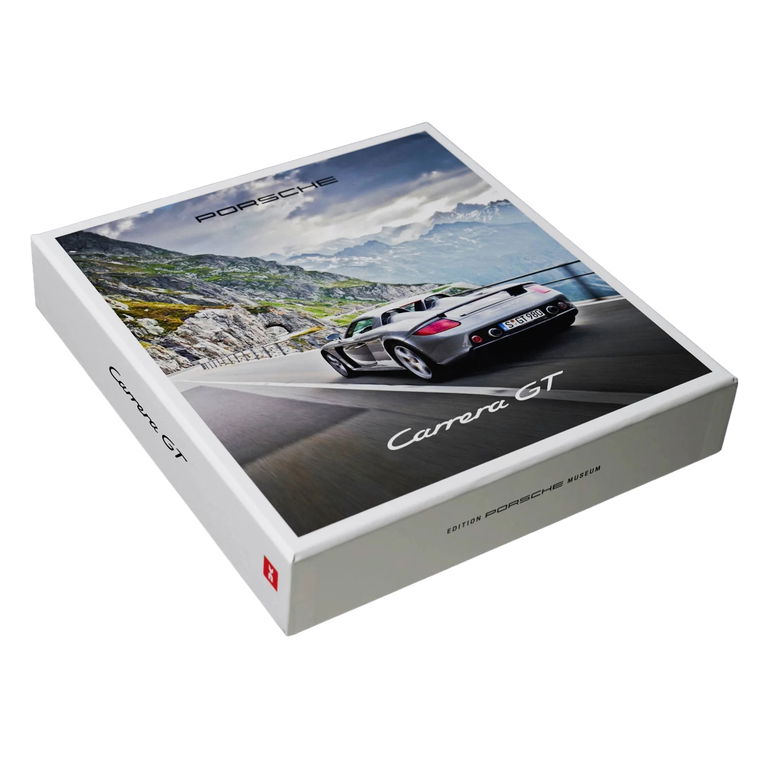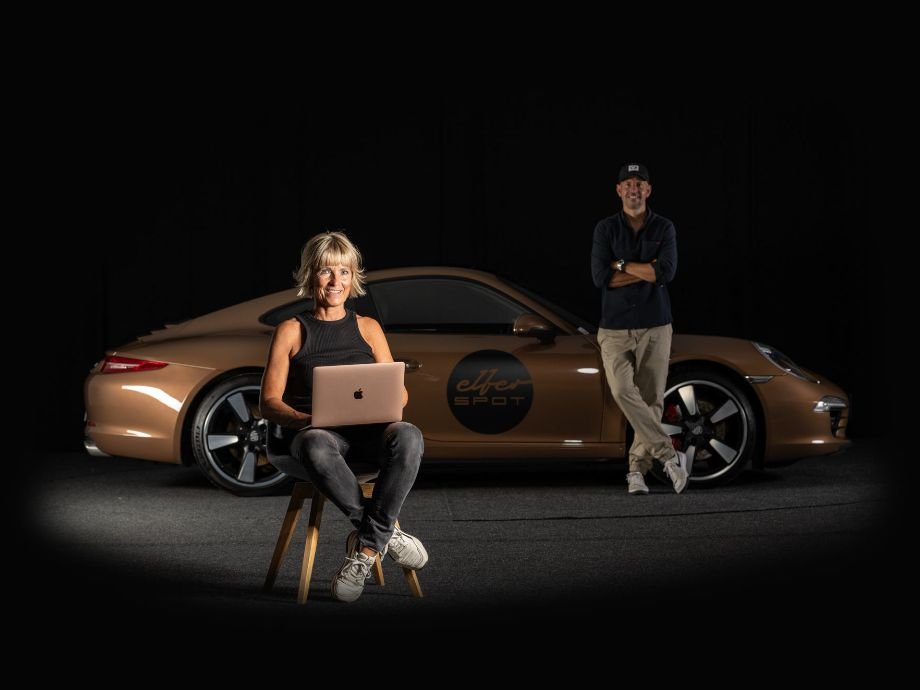With front lift unavailable at launch, this car has since been retrofitted with a KW suspension system, allowing the nose to be lifted at the touch of a button. This system is completely reversible and all original components will be included with the sale.
Also accompanying the car are the original handbooks, tool kit and Porsche high-vis jacket, factory car cover, and documentation from the first registration of the car in 2004 in Germany. There is also a display with two miniature models, a 2004 German press tour kit, personalised Carrera GT paperweight, German language technical manual and brochure, and a press kit with engine model and VHS tape.
The seller is not aware of any prior bodywork damage.
In 2020, this Carrera GT was sent back to Porsche Centre Stuttgart for an engine-out service, and during this time it was decided to completely colour-change the car from its original GT Silver. It was stripped to a rolling chassis with all body panels painted off the car together in the chosen Dark Blue Metallic hue. Once all the panels were repainted, the car was reassembled.
Today, the paintwork is reported to be in exceptional condition overall, with the seller noting a very minor stone chip on the front bumper. All four alloy wheels are also in great shape.
Inside, the leather upholstery is in superb order, showing only slight surface creases in line with the age and low-mileage use, but with no significant wear. All of the buttons, as well as the main touchpoints of the steering wheel and beech wood gear knob, remain in very good condition.
The seller is not aware of any mechanical or electrical faults, and there are no warning lights on the dashboard.
The most recent MOT test was on 8 November 2021 at 5,870 miles, which resulted in a first-time pass with no advisories.
Its last scheduled maintenance was in July 2021 at 8,799 km (5,468 miles), when a service was carried out by Porsche Centre Reading.
In January 2020 at 8,069 km (5,349 miles), a comprehensive engine-out service was completed by Porsche Centre Stuttgart, with the colour change also taking place during this visit. Before this, it was serviced in June 2018 at 7,589 km (4,715 miles) by Porsche Centre Leipzig.
Dates and mileage:
28.11.2006 – Annual Service – Porsche Centre Perugia – 1,900 kms (1,180 mls)
22.08.2007 – Annual Service – Porsche Centre Koblenz – 3,776 kms (2,346 mls)
21.04.2010 – Annual Service – Rinaldi Racing – 5,138 kms (3,192 mls)
07.05.2012 – Major Service – Porsche Centre Leipzig – 5,395 kms (3,352 mls)
17.09.2015 – Small Service – Porsche Centre Leipzig – 7,534 kms (4,681 mls)
30.08.2017 – Quick Check – Porsche Centre Leipzig – 7,549 kms (4,690 mls)
06.06.2018 – Small Service – Porsche Centre Leipzig – 7,589 kms (4,715 mls)
20.01.2020 – Major Service – Porsche Centre Stuttgart – 8,069 kms (5,349 mls)
20.01.2020 – Colour change to Dark Blue Metallic carried out by Porsche GmbH, Stuttgart
01.07.2021 – Small service – Porsche Centre Reading – 8,799 kms (5,468 miles)
The Porsche Carrera GT
The story of the Porsche Carrera GT starts in the early 1990s. Porsche had designed a 3.5 litre V10 for the Footwork Formula One team, but Footwork pulled out of the partnership leaving Porsche with an engine but no car. After the decision to use the engine in a future prototype, Porsche engineers further developed the V10 with a view to racing it at Le Mans. At the end of the 90s however, Porsche decided to invest their money in producing a 4×4 (the Cayenne) and so the Le Mans project was cancelled. Again, Porsche was left with a V10 that had years of development behind it but no car in which to put it.
After success at Le Mans with the 911 GT1 and LMP1-98, Porsche planned to build a new Le Mans prototype for 1999 with a tradtional Porsche flat-6 – but it was then decided the still born V10 would make a more suitable development powerplant and the chassis was redesigned to accomodate this engine. Ultimately commercial considerations concerning the requirement for an allocation of resources to develop the forthcoming Cayenne SUV thwarted the development of the racecar. It was not untill 2000 at the Paris show that Porsche showed the Carrera GT concept mainly as an attention gathering exercise with 3.5 litre V10 enlarged to 5.7 litre V10. Either way, it worked in that there was real interest in the V10 hypercar and an encouraging order book for the Cayenne meant the car was placed in limited production to be made at the new Porsche manufacturing facility in Leipzig. Porsche started a production run of Carrera GTs in 2004, the first Carrera GT went on sale in the US on January 31, 2004.
This naturally aspirated hypercar was a triumph and by the time production was was finshed in May 2006 1270 had been sold – all in LHD.
The 5.7 litre V10 engine was a true masterpiece. Engineered to be used in motorsport it was built purely for performance. This was a lightweight (215kg) high revving motor, reaching peak power at 8,000rpm and redlining at 8,200rpm. The engine pulled relentlessly from 3,000rpm all the way up to 8,200rpm with no flat spots in the power delivery, accompanied by a very special soundtrack. Producing 604bhp, 435lb-ft of torque, reaching 62mph in 3.7 seconds and topping out at 206mph.
The Carrera GT was very light, weighing just 1,250kg. The chassis was cutting edge, and the first to have both the tub and sub frame made from carbon fibre. The engine was bolted directly to the carbon frame and dry sumped to lower the centre of gravity. Fuel tanks were set either side of the engine in order to distribute weight evenly. Weight was also saved through the lightweight seats and carbon fibre roof.
Of course today the Carrera GT is distinguished by the fitment of an analogue manual gearbox but that doesn’t mean the transmission wasn’t state of the art. The lightweight racing clutch was made of multi-plate carbon ceramic. The clutch’s small diameter gave instantaneous rev gain and enabled Porsche to mount it low in the car, which helped to lower the centre of gravity.
Borrowing heavily from race car design, the Carrera GT had wishbone suspension with inboard dampers. The suspension units themselves were made from structural carbon fibre. The brakes were carbon ceramic with mono-bloc callipers giving huge stopping power. There was a carbon fibre active spoiler which raised up at 78mph to increase downforce, and the huge air scoops on each side of the car channelled cooling air to the V10.
Today the Carrera GT has acquired a mythical status as one of – if not the – ultimate analogue naturally aspirated sports car and the rise in values over the last few years reflect the fact that due to legislation and other factors, cars like this will never be made again.























































































